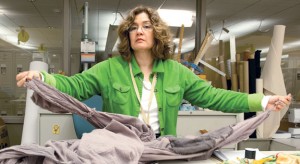To a stranger peeking through the window of Dillingham Room 020, the scattered piles of cloth, scissors and beads that lie on the tables within may signal chaos.

But amid the hustle and bustle of the room, where half a dozen students iron and adjust seams, a woman with thick brown hair sits contently at a sewing machine. Through her slender glasses, Lilly Westbrook’s gaze stays focused, trained on the needle that stitches black beading to cream-colored cloth. To the 49-year-old wardrobe veteran, it’s all about “piecing the puzzle together.”
“That’s the challenge, finding when you have an approach and the approach doesn’t work, opening yourself to another approach and hoping that somewhere along the line you’re going to discover something that works,” she said.
For the last 22 years, Westbrook has worked at Ithaca College as the costume shop manager in the Department of Theatre Arts. From her hub in Dillingham, she oversees and executes the production of every costume used in the college’s main stage shows. In total, Westbrook has worked on more than 130 student productions and is now working to dress the actors in the upcoming Dillingham production of Mozart’s famed opera “The Magic Flute.”
For Westbrook, the daily routine of dressing Dillingham’s performers begins months before the actors set foot on a stage. After analyzing the script, costume designers develop intricate sketches they think befit the show’s characters. Though Westbrook does not decide what each costume will convey to the audience, she plays the pivotal role of translating the designers’ ideas into real creations.
Costume designer Greg Robbins, associate professor of theatrical design, has worked alongside Westbrook for more than 20 years. Robbins said in the designing process, there are moments “of pure creative vision, then moments to bring it back to reality.” It is during these moments, he said, when Westbrook shines in her own role.
The conversion of sketch to full costume does not always begin with a full-fledged piece. Westbrook and Robbins work together to create small samples that will eventually be turned into the full costumes.
“To go from the two-dimensional to the three-dimensional, we’ll just use really cheap fabrics and really cheap quick methods,” he said. “We move ahead from there to the more expensive fabrics.”
In the costume shop, Westbrook’s fingers leave a piece of beaded cloth to point at a binder, propped open on the table to display a sketch. Etched in hundreds of colorful pen strokes, it depicts a dress designed for The Queen of the Night, one of the primary characters in “The Magic Flute.”
As a design instructor, Westbrook must strike a balance between her managerial position in the shop and her role in the classroom. Westbrook said she discovered her affection for teaching as a graduate teaching assistant at Purdue University.
“It’s not so much teaching them a task: What you celebrate is the moment that they get it,” she said. “That lightbulb moment is the thrill.”
Though she originally interviewed for a teaching position at Cornell University, she was referred to the Ithaca College theater department by her interviewer, who had attended a wedding with the scene designer at Ithaca.
“I didn’t even know they were looking for the position,” she said. “The position found me.”
In the back of the shop sits a mannequin, pinned with black fabric and a skirt four times as wide as its waist. She points to the bodice and the support structures for the lower half of the costume, camouflaged by layers of black feathers, beading and sheer fabric.
This particular costume will take 200 hours to complete.
For every original costume creation in “The Magic Flute,” Westbrook and her team of costumers will augment and adjust three others. With a cast of 40 performers and a wardrobe of 50 costumes, there’s always more to do.
As she shuffles back to the table, a student asks her for a new assignment. Another asks how to stretch and separate a feathery, green piece of fabric that Westbrook will eventually apply to a pair of pants. Westbrook smiles and patiently explains the steps. As her fingers pull at the cloth, her gaze remains on the student.
Students in the college theater department arrive with different levels of skills. The greatest challenge of working with untrained students, Westbrook said, is understanding that every show will be finished, but there will always be “balanced compromises.”
“The beauty of it is you discover students’ strengths,” she said.
Other circumstances, such as reduced funding, impede the costume shop’s capabilities. In the 2011 production of “Coram Boy,” the design team requested characters wear wigs, but the limited funds available to the costume shop prevented many characters from having them.
“The product is not always the focus — the process is,” she said. “Just because the product is less than ‘A’ doesn’t mean the process wasn’t an ‘A-plus.’ That’s the difference.”
Johanna Pan, a junior theatrical production arts major and costume shop assistant, said students from all studies and focuses in the theater department choose to work in the costume shop because of its warm and welcoming atmosphere.
“She’s nicknamed Mama Lil,” Pan said. “Not only is she the only female tech and design staff member, she is also kind of like our mom away from home.”
In the shop, there is still trimming and a few finishing touches to be completed before opening night. Westbrook returns to the sewing machine to maneuver endless bunches of black beading under the needle. She turns to the ironers and the sewers to ask if anyone needs any help. For the moment, all is well.
“The genius [of theater] is in the live moment,” Westbrook said. “That’s what keeps you going. When it all comes together, when it’s a beautiful design and the performers are on and the technicians are working well, and the scenery and the costumes and the lighting are all functioning and working well, the live moments are coming together, that’s art.”





